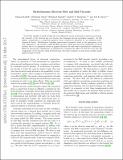Hydrodynamic electron flow and Hall viscosity
Abstract
In metallic samples of small enough size and sufficiently strong momentum-conserving scattering, the viscosity of the electron gas can become the dominant process governing transport. In this regime, momentum is a long-lived quantity whose evolution is described by an emergent hydrodynamical theory. Furthermore, breaking time-reversal symmetry leads to the appearance of an odd component to the viscosity called the Hall viscosity, which has attracted considerable attention recently due to its quantized nature in gapped systems but still eludes experimental confirmation. Based on microscopic calculations, we discuss how to measure the effects of both the even and odd components of the viscosity using hydrodynamic electronic transport in mesoscopic samples under applied magnetic fields.
Citation
Scaffidi , T , Nandi , N , Schmidt , B , Mackenzie , A P & Moore , J E 2017 , ' Hydrodynamic electron flow and Hall viscosity ' , Physical Review Letters , vol. 118 , no. 22 , 226601 . https://doi.org/10.1103/PhysRevLett.118.226601
Publication
Physical Review Letters
Status
Peer reviewed
ISSN
0031-9007Type
Journal article
Description
The authors acknowledge support from the Emergent Phenomena in Quantum Systems initiative of the Gordon and Betty Moore Foundation (T. S.) and NSF DMR-1507141 and a Simons Investigatorship (J. E. M.). We also acknowledge the support of the Max Planck Society and the UK Engineering and Physical Sciences Research Council under Grant No. EP/I032487/1.Collections
Items in the St Andrews Research Repository are protected by copyright, with all rights reserved, unless otherwise indicated.

